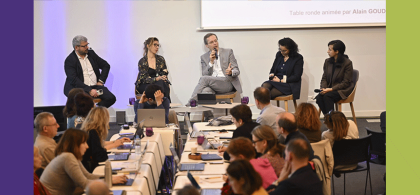
“Artificial Intelligence helps me set higher standards”
Published on 30/05/2025
Can artificial intelligence be used in the service of academic excellence? The question arises as these tools are being increasingly used by students in the preparatory classes, by almost 80% of them. Agathe Mezzadri-Guedj, Humanities teacher at the Lycée Michelet de Vanves, decided to look into this. Here’s what she found.
You are a Humanities teacher in the preparatory classes. How has AI turned up in your students’ work? It didn’t really turn up in their work, because I don’t ask them to do any assessments at home, and the students don’t have access to any digital tools when they do practice tests. It was my fellow exam tutors who alerted me. It can happen that some students are able to use AI when taking a catch-up test. We started to see some extremely obscure references, such as a Baroque play from the seventeenth century, which even I had never heard of. And you can see straightaway when somebody is talking about something they don’t understand. We thought it was impossible to cheat in our discipline, but this certainty has been totally overturned with artificial intelligence. Although at this stage of cutting and pasting, it is quite a sterile practice that doesn’t actually help the student improve.
What was your reaction?
My reaction was totally pragmatic, with no moralising or ideology. I said to myself, if they’re using AI when they get the chance, I need to understand what it’s all about and support them. First, I asked artificial intelligence to produce the same dissertations as my students had to write, such as “Do you need everything to create a world?” or “Remaining yourself”. I wrote a detailed prompt. I tested several different types of AI: GPT 3.5, GPT 4, LLama 2, Claude 3 and Perplexity.
Was the work of the artificial intelligence good or not?
Some AIs are very good at finding the contradiction or paradox in a subject, but they are incapable of deepening its philosophical foundation. In “Remaining yourself”, they identified the tension entre authenticity and otherness, but they completely failed to question what exactly was meant by “yourself”. And as far as philosophical references were concerned, there were glaring errors. For example, one AI quoted Plato, saying that his ideal city welcomed everyone, which is not true because Plato excluded poets and did not consider either women or foreigners to be citizens. AI knowledge is still incomplete and vague.
Did you then use these dissertations as teaching aids?
Yes, the students critiqued them as if they were teachers. That taught them the methodology of the dissertation. It’s easier to see the mistakes of others than your own. It helped me develop their critical thinking on what artificial intelligence produces.
As most generative artificial intelligence originates in the English-speaking world, was that also noticeable in the dissertations it produced?
It certainly was. For example, all the AIs took me to Jean Valjean when I questioned them, because the English-speaking world has assimilated Les Misérables by Victor Hugo. That causes a problem of bias in the AI corpus: not all works have been digitised, not all content such as Gallica in the BNF (French National Library) has been sucked up by it. It’s useful to make them aware that these tools can create a kind of cultural funnel. AI is not complete, is it not reliable. So we must keep looking things up in books. That’s why, for example, I get them to study a very important work from the sixteenth century that you can’t find anywhere on the Internet, Jerusalem Delivered, by the Italian poet, Tasso.
Knowing that the students can rely on these tools, do you set higher standards for them?
I would say that it helps me set high standards. I point out to them that on the day of the exam, we are assessing human intelligence not AI. It also allows me to define what it means to think like a human being, that is, not automatically, but with a critical mind and sensitivity – qualities lacking in AI. It does not yet sufficiently develop references, and in some respects could be considered an anti-model.
What is your definition of excellence?
Excellence is always within a targeted field and it involves a person. It really means surpassing yourself in a particular area. And this idea that someone can be excellent in an overall way bothers me. I’m not sure, I think it’s a very romantic vision of a rather intimidating genius. I have a more modest approach, more focussed on excellent work.
In the 2025 academic year, you will be teaching a course at NEOMA that links literature and management. What’s that about?
My course is entitled “Lessons from great literary texts: management, entrepreneurship and leadership”. Literature can inspire leadership and creativity. I sincerely believe that in literature there are texts that are very relevant to the professional world. I will be bringing my reading and my knowledge into the lecture theatres.



